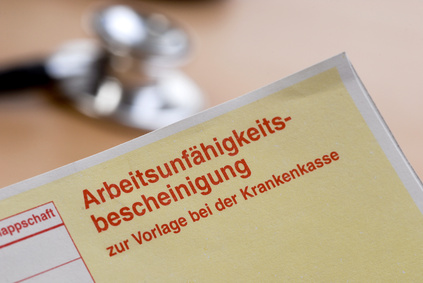
Small children are often sick. That is normal. As a rule, this means that one parent, usually the mother, has to look after the child. In this case, employees are entitled to an exemption from the employer. However, there is often no entitlement to continued wages. Statutory health insurers can however apply for child sickness benefit from their health insurance company.
We tell you whereupon it arrives and where you get your money from.
Child falls ill: What needs to be done under labor law??
If a child is ill and cannot go to daycare, kindergarten or school, parents with both parents working have a problem because smaller children cannot be left alone at home. You need to be looked after.
It is therefore regulated in such cases that employees are entitled to leave their employer for the purpose of caring for sick children. You should therefore inform your employer immediately about the illness and the expected duration and also provide evidence of this by a corresponding certificate from the treating pediatrician. In any case, this ensures that your employer cannot consider your absence from work as an excuse to stay away from work. Otherwise there will be a warning and, in the worst case, termination.
Who pays when work is canceled due to a child’s illness?
There may be a right to continued payment of wages against the employer, but also a right to payment of child sick pay against the health insurance company.
Continued payment of wages by the employer
In labor law, the principle applies without wages without work. This means that employees generally only have a right to wages if they have also worked. An exception applies if a so-called special rule “wages without work” applies. In such cases the regulation of § 616 BGB comes into consideration. If an employee is unable to work for a relatively insignificant period of time for no reason whatsoever, he basically retains his right to wages. Since this regulation is very vague and also not mandatory, it is often regulated in collective agreements, company agreements or even in employment contracts, whether at all, and if so, for how many days the employer pays wages. It is legally permissible to completely exclude the regulation.
So in order to clarify the question of whether the employer will also keep you away for the time of absence illness owed a child’s wages, you must first check in your employment contract whether a provision has been made there that precludes the application of § 616 BGB. If not, then the employer must pay you wages. However, if § 616 BGB is waived, there is no wage claim against the employer. The only exception is for trainees. If they already have a child, they are always entitled to continued payment of wages, even when they are not themselves ill but have to look after a child due to illness.
In the case of legally insured child sickness benefit through the health insurance
If the employer is not obliged to pay and you have health insurance from a statutory health insurance provider, you should contact your health insurance provider directly. On request, this pays you child sickness benefit for the time of unpaid leave to care for a child, § 45 SGB V. However, the prerequisite for this is that the child is under the age of twelve and also legally insured, the doctor considers the care necessary and from has issued a corresponding certificate on the first day of illness and there is no other person in the household, the the Could take care. So life, e.g. the grandparents in the household and are still armed enough to take care of the sick child, then the health insurance would not step in.
The benefits that the health insurance provider provides correspond to the benefits for normal sickness benefits. The health insurance company therefore pays 90% of the lost net wages from the first day, whereby the maximum amount in 2018 was € 103.25 / day. Since child sickness benefit is a wage replacement benefit, the payment must again be stated in the tax return, so it is still taxable.
Child sickness benefit is paid per parent for a maximum of 10 working days, i.e. a total of 20 working days. Single parents are entitled to 20 working days.
Private health insurers have no comparable claim
Private insurers were unlucky. There is no comparable benefit in private health insurance. Incidentally, there is no entitlement even if the mother has statutory health insurance, for example, but the child was privately insured through the father himself.
So if you have private health insurance, you should make sure when concluding your employment contract that the regulation of § 616 BGB is not waived.
RELATED ITEMS
-

Child sick – entitlement to leave and continued payment?
The child is sick and the worker reports sick – a scenario that last year (2016) was almost 2.5 million times…
-

Child sick? Release of the employee from work and continued payment of the salary – lawyer will
Sickness benefit if the child falls ill (Photo: © -Bernd Leitner / fotolia.de) Employees are generally entitled to leave from work if…
-

Time off from work if the child is sick
Pia Kotzur has been working as an editor at NetMoms since 2010 and has since been able to gain a lot of experience on what moves mothers in everyday life. After your…
-

Continued payment of wages in the event of illness – employer and health insurance
Continued payment of wages in the event of illness has been regulated in a uniform manner since 1994 in the Continuing Pay Act (EFZG), §§ 3 ff. For employees. What…
